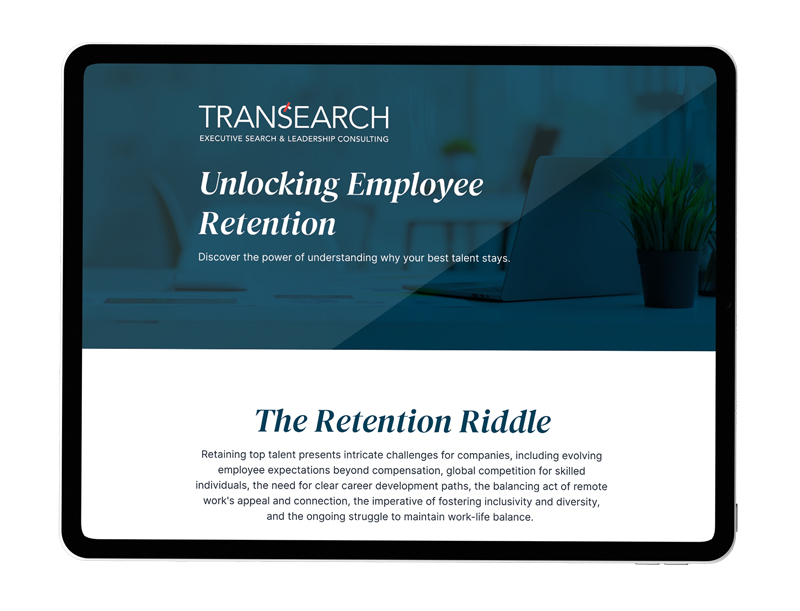What does it require to advance from a management position to an executive role? When you’re a manager, you do the hands-on work of ensuring that your team’s day-to-day operations run smoothly. You’re versed in the systems and processes that enable your unit’s daily efforts. You oversee that work and keep those who execute it motivated, engaged, and fully operational.
But what does it take to get to the next level, to be seen as an executive? How do you demonstrate the leadership skills needed for such a role in an interview?
The executive-level interview is different from other types of interviews. It’s not simply about your ability to do the job but your potential to lead. To be successful, you must show that you have the vision and the ability to see the big picture. You must be able to articulate a strategy and then rally others to execute it.
If you’re aiming for a C-level position, you must prepare for a different interview process. You’ll want to know what you can expect and how to make the most of it. Here are some tips to help you prepare for an executive-level interview:
You’re the visionary
When you interview for an executive-level role, the focus will be on your ability to prove you can conceptualize a goal and then lead a team to execute your vision. You’ll need to be able to articulate your strategy and then rally others to make it happen. This requires more than just technical skills; it also requires leadership skills.
As a manager, your boss may have told you the grand vision. Your role is to lead your team to complete a portion of that overall goal. But at the executive level, it’s up to you to develop that vision and see it through. A daunting task, but it’s one that you must prepare to take on if you want to be successful in an executive-level interview.
Show your skills
The best way to make a great impression in an executive-level interview is to prepare, prepare, prepare. Consider putting together a business plan before your interview; show the interviewer that you have the skills to develop a vision and execute it. If you can present a well-thought-out plan, it will demonstrate your ability to think strategically and lead effectively.
You can ask for information or numbers specific to the company you’re interviewing to integrate that data into your vision and business plan. But even if you don’t have access to that level of detail, you can still put together a solid plan that will show the interviewer that you have what it takes to lead at the executive level.
Bridge the experience gap
If you’re currently a manager and ready to pursue an executive role, you might prepare by cultivating leadership experience outside your current position. This may require you to take on added responsibilities or seek opportunities to lead projects.
If you have the opportunity, try serving on a non-profit board. It gives you a chance to see if you like this work and if it might be a fit for you. Plus, it gives you relevant experience to discuss in an executive-level interview.
Prove you can handle the pressure
An executive-level interview is likely to be more intense than other interviews. The stakes are higher, and the interviewer will be looking for evidence that you can handle the pressure of the role. Be prepared to discuss how you handled difficult situations in the past. Have examples ready to share of times when you had to make tough decisions.
Discuss your accomplishments
You can expect to be asked to describe your accomplishments. Take this opportunity to sell yourself and demonstrate why you’re the best candidate for the job. Be prepared to discuss your successes straightforwardly. Have numbers and specific examples ready to share.
Know your value proposition
An executive-level interview is also an opportunity for you to sell yourself and your unique talents and skills. Be prepared to articulate your value proposition—the unique combination of skills and experiences that makes you the best candidate for the role. Show that you’re more than just a list of accomplishments; you’re a strategic thinker and leader who can add value to the organization.
Be ready to answer tough questions
Interviews for senior leadership roles often include questions designed to trip you up. You will be asked to describe instances when you failed or made a mistake. Answer these questions honestly and thoughtfully. Don’t try to hide your mistakes; instead, use them as an opportunity to show how you learned from them and grew as a result. Your interviewer will appreciate your authenticity and grace.
Avoid imposter syndrome
One of the biggest challenges you may face in an executive-level interview is imposter syndrome—the feeling that you’re not qualified for the role and will be exposed as a fraud. This is a common feeling, but it’s important to remember that you wouldn’t have been selected for the interview if the interviewer didn’t believe you were qualified. So, try to push those feelings aside and focus on proving why you’re the best candidate for the job.
Remember, the people on the other side of that table (or screen) are people like you. They have more experience, sure, but they’re not superhumans. They’re looking for someone who can do the job and believe you can. So go into that interview confidently, knowing you have what it takes to land the executive-level role you deserve.
The future is yours
An executive-level interview is not only about your past accomplishments; it’s also about your future potential. The interviewer will want to know what you hope to achieve in the role and how you plan to get there. This is your chance to share your vision for the organization and to show your ability to think long-term.
These are just some things you can expect in an executive-level interview. By being prepared and knowing what to expect, you’ll be in a better position to ace the discussion and land the leadership position you deserve.
















